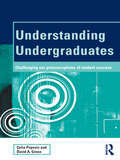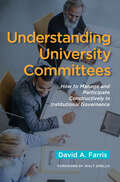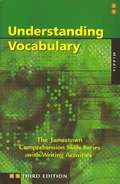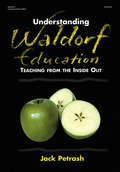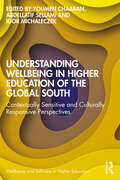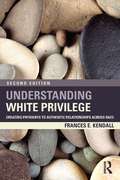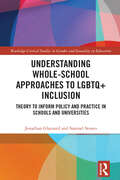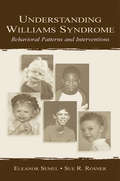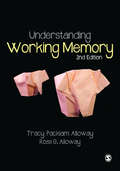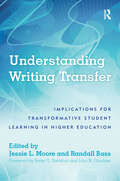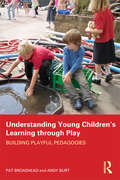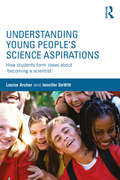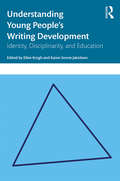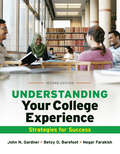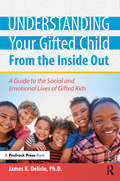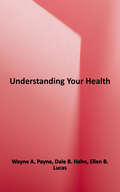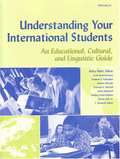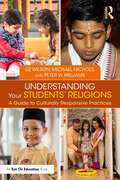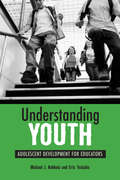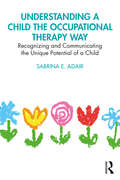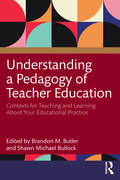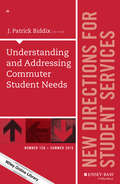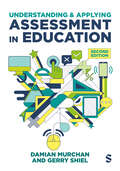- Table View
- List View
Understanding Undergraduates: Challenging our preconceptions of student success (SEDA Series)
by David A. Green Celia PopovicMost university teachers have ideas about the typical good or not-so-good student in their classes, but rarely do they share these thoughts with others. By keeping quiet about the preconceptions – or stereotypes – they harbour, teachers put themselves at risk of missing key evidence to help them revise their beliefs; more importantly, they may fail to notice students in real need of their support and encouragement. In this unique work, the authors explore UK and US university teachers’ beliefs about their students’ performance and reveal which beliefs are well-founded, which are mistaken, which mask other underlying factors, and what they can do about them. So is it true, for instance, that British Asian students find medicine more difficult than their white counterparts, or that American students with sports scholarships take their studies less seriously? Is it the case that students who sit at the front of the lecture hall get better grades than those who sit at the back? By comparing students’ demographic data and their actual performance with their teachers’ expectations, the authors expose a complex picture of multiple factors affecting performance. They also contrast students’ comments about their own study habits with their views on what makes a good learner. For each preconception, they offer clear advice on how university teachers can redesign their courses, introduce new activities and assignments and communicate effective learning strategies that students will be able to put into practice. Finally, the authors explore the ramifications of teachers’ beliefs and suggest actions that can be taken at the level of the institution, department or programme and in educational development events, designed to level the playing field so that students have a more equitable chance of success. Ideal for both educational developers and university teachers, this book: reveals general tendencies and findings that will inform developers’ own work with university teachers, provides practical guidance and solutions for university teachers to be able to identify and address students’ actual – rather than assumed – needs, explores means of addressing and challenging people’s natural tendency to rely on preconceived ideas and stereotypes, and explains an action research method that educational developers can use on their own campuses to unravel some of the local preconceptions that may be hampering student success.
Understanding University Committees: How to Manage and Participate Constructively in Institutional Governance
by David A. FarrisCommittees are indispensable to the governance of higher education, yet there is seldom guidance to faculty and administrators on how committees should be conducted or how to maximize committee obligations. This is the first handbook on how both to manage committees and how to engage effectively as members to achieve departmental or broad institutional goals, and how participation valuably contributes to individual learning and advancement.Based on empirical research, organizational theory, and interviews with faculty and administrators, Dr. David Farris provides an informative and vivid examination of the dynamics of committee work, addresses the planning, conduct, roles, composition, and dispositions of members as well as the institutional context and structures in which they operate that are vital to organizational success.Committees are not just laboratories for implementing the vision of university leadership, developing solutions to institutional challenges, and refining organizational procedures; they are the proving ground for future leaders in higher education. How members perform in committees reflects our professionalism, aptitude, integrity, and character – all-important considerations given that we serve as ambassadors for our department, college, office, and colleagues.In offering guidance on good committee practices, a recurring theme of this book is that readers should critically evaluate individual performance and how it impacts others or the committee at large. Too often the locus of control is presumed to be reserved for the chairperson even though significant influence can be exercised through informal leadership, member dispositions, and leveraging social networks.In addition to reviewing the mechanism of committees, David Farris provides practical information regarding the functional application of committees (tactical, operational, or strategic), committee leadership and management, group dynamics that influence committee performance, and the importance of diversity and inclusive committee cultures to institutional performance. Throughout the book he identifies opportunities for faculty and administrators to reflect on their committee experiences, challenges readers to consider how to capitalize on committee experiences, and consider the various ways that committees shape institutional culture and performance.This book provides guidance on how to create committees that are conducive to fair, equitable, and engaging participative decision-making experiences to yield the best results and to promote enthusiasm for participation in committees, whether as chairs or committee members.
Understanding Vocabulary (The Jamestown Comprehension Skills Series)
by McGraw-Hill Education Editors McGraw-Hill Education Staff Jamestown PublishersThe Comprehension Skills Series teaches students to become stronger, efficient readers by developing ten important, specific reading comprehension skills.
Understanding Waldorf Education: Teaching from the Inside Out
by Jack PetrashWritten by a teacher with more than 25 years of experience, this book offers a jargon-free view of Waldorf education and its philosophy of the importance of a three-dimensional education. Through learning experiences that involve all of the senses, children use a variety of intelligences to develop thought, feeling, and intentional, purposeful activity. Whether you're Waldorf parent or teacher, or you just want to learn more about these innovative educational concepts, this book contains important ideas on learning that you can apply today.
Understanding Wellbeing in Higher Education of the Global South: Contextually Sensitive and Culturally Responsive Perspectives (Wellbeing and Self-care in Higher Education)
by Abdellatif Sellami Youmen Chaaban Igor MichaleczekThis edited book gives voice to previously unheard narratives on wellbeing in higher education and provides novel implications for higher education policy and practice.Offering contextually sensitive and culturally responsive perspectives, the book problematizes wellbeing in higher education as it is currently theorized in the Global North, bringing to the fore perspectives and multi-disciplinary insights from the Global South region. Chapters present an alternative conceptualization of wellbeing in higher education based on stories, perceptions, and experiences of university students, faculty, and leaders from the Global South region, challenging a reductionist view of wellbeing and embracing its complexity, multi-dimensionality and context-sensitivity. The authors present an alternative non-Western approach to thinking, researching, and doing wellbeing in higher education, offering clear guidelines to support teachers, educational researchers, and leaders in fostering a more holistic teaching and learning experience.This volume will stimulate policy development and enactment, as well as university-wide interventions and practices that can make a difference in the lives of students in higher education.
Understanding White Privilege: Creating Pathways to Authentic Relationships Across Race (Teaching/Learning Social Justice)
by Frances KendallKnowingly and unknowingly we all grapple with race every day. Understanding White Privilege delves into the complex interplay between race, power, and privilege in both organizations and private life. It offers an unflinching look at how ignorance can perpetuate privilege, and offers practical and thoughtful insights into how people of all races can work to break this cycle. Based on thirty years of work in diversity and colleges, universities, and corporations, Frances Kendall candidly invites readers to think personally about how race — theirs and others’ — frames experiences and relationships, focusing squarely on white privilege and its implications for building authentic relationships across race. This much-anticipated revised edition includes two full new chapters, one on white women and another extending the discussion on race. It continues the important work of the first, deepening our knowledge of the recurring history on which cross-race relationships issues exist. Kendall’s book provides readers with a more meaningful understanding of white privilege and equips them with strategies for making personal and organizational changes.
Understanding Whole-School Approaches to LGBTQ+ Inclusion: Theory to Inform Policy and Practice in Schools and Universities (ISSN)
by Jonathan Glazzard Samuel StonesThe book provides a comprehensive theoretical exploration of LGBTQ+ inclusion in schools drawing on critical insights from across the disciplines of sociology, psychology, history, and queer theory to present a robust theoretical foundation for school-wide approaches to LGBTQ+ inclusion.Examining key concepts such as minority stress and ‘post-gay’ identities, it offers a nuanced understanding of the historical attitudes and systemic oppression faced by the LGBTQ+ community. The chapters construct an ecological framework that highlights the unique challenges encountered by LGBTQ+ students and teachers in educational settings. This framework serves as the basis for a model that advocates for proactive measures in fostering an inclusive environment in schools. This includes the development of inclusive policies, practices, culture, and curricula. The book concludes by contemplating the potential applications of this model in Higher Education, extending its relevance beyond K-12 schools to also include universities and colleges.This volume will be valuable resource for researchers, scholars, educators, and policymakers interested in promoting LGBTQ+ inclusion in educational institutions, and with interests in gender and education, whole-school approaches, LGBTQ+, and diversity and inclusion more broadly.
Understanding Williams Syndrome: Behavioral Patterns and Interventions
by Eleanor Semel Sue R. RosnerComprehensive and readable, Understanding Williams Syndrome: Behavioral Patterns and Interventions is an essential guide for all those professionally, scientifically, or personally involved with this so frequently misunderstood and underserved population--psychologists, psychiatrists, social workers, and other mental health professionals; special educators and vocational counselors; speech-language, physical, and occupational therapists; audiologists; physicians; and parents. In the last 20 years, Williams syndrome has captured the interest of large numbers of scientists and attracted considerable media attention in spite of its rarity (estimated at no more than one in 30,000 births). Those diagnosed display a unique pattern of behavioral, cognitive, and physical limitations and strengths with fascinating neurogenetic implications--a pattern that poses enormous challenges to their parents and caregivers. The authors, a specialist in learning disabilities and a developmental psychologist, review basic information about Williams syndrome, its medical conditions, paradoxical profile, and neurobiological mechanisms; and discuss distinctive features of the language and perceptual and motor performance of children and adults with the syndrome. Other features include:* Strategies for working with patients.* An examination of the difference between Williams syndrome and other developmental disorders.* Problem-specific alternatives for treatment.* Analysis of new directions in research, clinical intervention, education, and systems for care delivery. Throughout, they stress variations among individuals and subgroups in ability level, skills, talents, and problem severity; and emphasize the necessity of recognizing these components in planning treatment on an individual basis.
Understanding Working Memory
by Tracy Packiam Alloway Ross G AllowayWorking memory is how your brain stores information for a short period of time and how much you can fit on this 'post-it note' hugely influences how well you do at school and beyond. Understanding working memory means you will be able to better support children's learning and concentration. This can be particularly useful to children with conditions such as dyslexia, ADHD and autistic spectrum disorders, where poor working memory is thought to be an underlying factor. New to this edition are: · A new chapter on emotional difficulties and working memory · A clear chapter structure which looks at the what, where, why and how for every difficulty. · More information on how to work with younger children This book will make sure you are able to spot problems early, work with children to improve their working memory and ensure they reach their full potential. Tracy Packiam Alloway is an award-winning psychologist based at the University of North Florida Ross Alloway is the CEO of Memosyne Ltd, a company that brings cutting-edge scientific research to parents.
Understanding Writing Transfer: Implications for Transformative Student Learning in Higher Education
by Randall Bass John N. Gardner Betsy O. Barefoot Jessie L. MooreWhile education is based on the broad assumption that what one learns here can transfer over there– across critical transitions – what do we really know about the transfer of knowledge?The question is all the more urgent at a time when there are pressures to “unbundle” higher education to target learning particular subjects and skills for occupational credentialing to the detriment of integrative education that enables students to make connections and integrate their knowledge, skills and habits of mind into a adaptable and critical stance toward the worldThis book – the fruit of two-year multi-institutional studies by forty-five researchers from twenty-eight institutions in five countries – identifies enabling practices for, and five essential principles about, writing transfer that should inform decision-making by all higher education stakeholders about how to generally promote the transfer of knowledge.This collection concisely summarizes what we know about writing transfer and explores the implications of writing transfer research for universities’ institutional decisions about writing across the curriculum requirements, general education programs, online and hybrid learning, outcomes assessment, writing-supported experiential learning, e-portfolios, first-year experiences, and other higher education initiatives. This volume makes writing transfer research accessible to administrators, faculty decision makers, and other stakeholders across the curriculum who have a vested interest in preparing students to succeed in their future writing tasks in academia, the workplace, and their civic lives, and offers a framework for addressing the tensions between competency-based education and the integration of knowledge so vital for our society.
Understanding Young Children’s Learning through Play: Building playful pedagogies
by Pat Broadhead Andy BurtThis timely and accessible text introduces, theorises and practically applies two important concepts which now underpin early years practice: those of ‘playful learning' and 'playful pedagogies'. Pat Broadhead and Andy Burt draw upon filmed material, conversations with children, reflection, observation, and parental and staff interviews, in their longitudinal study of outdoor and indoor play environments in an early years unit. This research-based text offers extensive insights into related theories, as well drawing on the authors’ skills and knowledge as researcher and as class teacher in order to provide opportunities for personal reflection and possibilities for practical application in early years classes and settings. Discussing both indoor and outdoor environments, the text explores ideas surrounding ‘open-ended play’, and ‘the whatever you want it to be place’. It illustrates how the themes of children’s play reflect their interests, experiences, knowledge gained at home and in school, and their cultural heritages. By showing how children become familiar and skilful within open-ended play environments, the authors illustrate how the children’s co-operative skills develop over time as they become connected in communities of learners. Alongside the examples of children’s playful learning, the book also considers the implications for resourcing and organising playful settings through playful pedagogies that connect with the Early Years Foundation Stage curriculum (DfES 2007) and with the Tickell Review, ongoing as the book went to press. Understanding Young Children's Learning through Play uses children’s perspectives on their play to illustrate how rich their personal understandings are. It also includes parental reflections on what may initially appear a risky and unusual outdoor environment, and it draws attention to the importance of conflict resolution in play in order to extend children’s resilience and assertiveness. This insightful text will be of interest to students of early years education, early years practitioners, academics and researchers.
Understanding Young People's Science Aspirations: How students form ideas about ‘becoming a scientist’
by Louise Archer Jennifer DeWittUnderstanding Young People's Science Aspirations offers new evidence and understanding about how young people develop their aspirations for education, learning and, ultimately, careers in science. Integrating new findings from a major research study with a wide ranging review of existing international literature, it brings a distinctive sociological analytic lens to the field of science education. The book offers an explanation of how some young people do become dedicated to follow science, and what might be done to increase and broaden this population, exploring the need for increased scientific literacy among citizens to enable them to exercise agency and lead a life underpinned by informed decisions about their own health and their environment. Key issues considered include: why we should study young people’s science aspirations the role of families, social class and science capital in career choice the links between ethnicity, gender and science aspirations the implications for research, policy and practice. Set in the context of widespread international policy concern about the urgent need to improve, increase and diversify participation in post-16 science, this key text considers how we must encourage a supply of appropriately qualified future scientists and workers in STEM industries and ensure a high level of scientific literacy in society. It is a crucial read for all training and practicing science teachers, education researchers and academics, as well as anyone invested in the desire to help fulfil young people’s science aspirations.
Understanding Young People's Science Aspirations: How students form ideas about ‘becoming a scientist’
by Louise Archer Jennifer DeWittUnderstanding Young People's Science Aspirations offers new evidence and understanding about how young people develop their aspirations for education, learning and, ultimately, careers in science. Integrating new findings from a major research study with a wide ranging review of existing international literature, it brings a distinctive sociological analytic lens to the field of science education.The book offers an explanation of how some young people do become dedicated to follow science, and what might be done to increase and broaden this population, exploring the need for increased scientific literacy among citizens to enable them to exercise agency and lead a life underpinned by informed decisions about their own health and their environment. Key issues considered include: why we should study young people’s science aspirations the role of families, social class and science capital in career choice the links between ethnicity, gender and science aspirations the implications for research, policy and practice. Set in the context of widespread international policy concern about the urgent need to improve, increase and diversify participation in post-16 science, this key text considers how we must encourage a supply of appropriately qualified future scientists and workers in STEM industries and ensure a high level of scientific literacy in society. It is a crucial read for all training and practicing science teachers, education researchers and academics, as well as anyone invested in the desire to help fulfil young people’s science aspirations.
Understanding Young People's Writing Development: Identity, Disciplinarity, and Education
by Ellen Krogh Karen Sonne JakobsenThis collection offers an inclusive, multifaceted look at individual students’ patterns of writing trajectories, as well as their development of an identity as a writer. Building on rare longitudinal research, this translated text explores how adolescents learn subjects through writing and learn writing through subjects. Contributors consider issues relating to different forms of writing and grapple with students’ ambivalence or resistance to this at school, together offering an examination of how the education system can rise to the challenge of offering today’s students meaningful and appropriate writing instruction. Bringing knowledge from writing researchers and educational researchers together, Understanding Young People’s Writing Development explores: Young adults’ complicated experiences with the school writing project Practices, purposes, and identification in student note writing Knowledge construction in writing as experience and educational aim The pedagogical challenges and perspectives of writing and writer development Creativity as experience and potential in writing development The impact of digital technologies and media on student writing Using students’ work to aid the understanding of practice, this book will help highlight the importance of viewing individual writer developments from a social, institutional, and societal context, and raise questions that will advance writing pedagogy and the teaching and learning of school subjects.
Understanding Your College Experience
by John N. Gardner Betsy O. Barefoot Negar FarakishUnderstanding Your College Experience is designed to give the students who need the most support the practical help they need to successfully make the transition to college and get the most out of their time there. For this new edition of the text, John N. Gardner, Betsy O. Barefoot, and Negar Farakish share their commitment to institutions, instructors, and students with new coverage of non-cognitive skills like motivation and resilience alongside the authors’ hallmark authoritative, research-driven approach. Every aspect has been crafted to address the needs of the widest possible range of students, from content coverage and organization, to activities, assessment, and design.
Understanding Your Gifted Child From the Inside Out: A Guide to the Social and Emotional Lives of Gifted Kids
by James DelisleUnderstanding Your Gifted Child From the Inside Out provides an engaging and encouraging look at raising gifted children today. A follow-up to the best-selling Parenting Gifted Kids: Tips for Raising Happy and Successful Children, this new edition focuses on the social and emotional aspects of giftedness, highlighting new information on the issues of perfectionism, self-advocacy, underachievement, mindfulness, and the impact of technology on gifted kids' relationships. The book also features a section on life beyond college, for those readers whose children are no longer children. Understanding Your Gifted Child From the Inside Out features real-life stories about the lives of gifted children and how they and their parents recognize and enjoy the many intellectual talents and social and emotional insights they possess.Texas Association for the Gifted and Talented 2019 Legacy Book Award Winner - Parenting
Understanding Your Health
by Dale B. Hahn Wayne A. Payne Ellen B. LucasThis book offers an exciting and practical approach to the teaching of the traditional content areas of personal health. Its two key themes - the six dimensions of health and the five developmental tasks - help students apply the text's content to their own lives, by improving their decision-making skills. The strength of the Understanding Your Health narrative includes its appeal to both traditional and non-traditional students, particularly the special attention it pays to students over age 25 who have returned to college. <p><p>In addition, among its many health assessment activities, Understanding Your Health includes one of the most comprehensive health assessments found in any personal health textbook - a great tool for establishing a health baseline for students. The companion Online Learning Center (website) offers a wealth of pedagogical and assessment features, including quizzes, Internet activities, downloadable MP3s, and more.
Understanding Your International Students: An Educational, Cultural, And Linguistic Guide
by Elizabeth L. Zollner Jeffra Joann Flaitz Leslie Kosel Eckstein Kimberly S. Kalaydjian Ariadne Miranda Deborah A. Mitchell Amna Mohamed Barbara Smith-Palinkas Jerome YorkUnderstanding Your International Students surveys the school cultures of the many countries whose students top the international student enrollment lists in the U. S. educational institutions. No other volume so comprehensively addresses the educational, cultural, and linguistic backgrounds of the international students who are studying in English-speaking countries. Understanding Your International Students is an excellent resource for all schools--it's designed to sensitize users to the myriad differences that exist among schools and students around the world, to pique interest in deeper cultural exploration, and to provide encouragement and support for effective cross-cultural problem-solving.
Understanding Your Students' Religions: A Guide to Culturally Responsive Practices
by Peter W. Williams Michael Nichols Liz WilsonThis concise guide helps educators understand the diverse religious practices that shape students’ school and home lives. Using an encyclopedia-like structure, the authors provide short histories and other essential information on a wide variety of religions as well as atheist practices.Each chapter covers origins, beliefs, practices, and common misunderstandings and stereotypes, as well as key holidays, religious dress, and dietary restrictions that can be accommodated in school. This book will help educators avoid stumbling over stereotypes so they can better engage students and their families and foster culturally responsive classrooms. Teachers of all grade levels will come away feeling more confident about identifying areas of cultural and religious practice where support for your students may be needed.You will also have the tools to recognize the diversity of religious and cultural practices that students bring to the classroom, and to see that unfamiliar religious and cultural practices are assets to be cultivated and not signs of deficiency.
Understanding Youth: Adolescent Development for Educators
by Michael J. Nakkula Eric ToshalisAdolescent development research and theory have tremendous potential to inform the work of high school teachers, counselors, and administrators. Understanding Youth bridges the gap between adolescent development theory and practice. Nakkula and Toshalis explore how factors such as social class, peer and adult relationships, gender norms, and the media help to shape adolescents&’ sense of themselves and their future expectations and aspirations.
Understanding a Child the Occupational Therapy Way: Recognizing and Communicating the Unique Potential of a Child
by Sabrina E. AdairThis book uses an occupational therapy way of thinking to guide the reader towards observing, understanding, and communicating the needs of children to foster a supportive environment. Presented in accessible, everyday language, this book takes a holistic approach of looking at a child from what makes them a unique person, what activities they are trying to accomplish, and what environment they are in. Each chapter helps readers identify, describe, and clearly articulate a different aspect of the child’s environment and how it may affect them, the way that they process different sensory inputs, what their behaviors may be telling us, and how they learn. By recognizing each child’s unique story and effectively communicating their story to others, the reader can identify the most effective ways to support a child to meet a child’s needs and set them up for success. Therapists, educators, parents, and childcare workers will all benefit from the simple strategies outlined in this book to enrich a child’s learning.
Understanding a Pedagogy of Teacher Education: Contexts for Teaching and Learning About Your Educational Practice
by Shawn Michael Bullock Brandon M. ButlerProviding readers with insights and examples of how teacher educators learn and teach a pedagogy of teacher education (PTE), Butler and Bullock organize a wholistic and practical resource for the next generation of teacher educators. Expanding on the highly referenced scholarship of John Loughran and Tom Russell, Understanding a Pedagogy of Teacher Education explores the learning of PTE through individual and collaborative endeavors, and large-scale institutional and cross-national initiatives. Contributors highlight their experiences teaching PTE in formal learning spaces, in international workshop settings, and on the program-wide scale in order to uncover how they came to understand PTE and enact it effectively. Each chapter connects broad strokes concepts of PTE to well-defined teacher education fields, such as social justice, literacy, early childhood education, and communities of practice. Blending well- established theory with contemporary examples, this book is a great tool for teacher education faculty, doctoral students, and those interested in improving their PTE or supporting others in their PTE learning.
Understanding and Addressing Commuter Student Needs: New Directions for Student Services, Number 150 (J-B SS Single Issue Student Services)
by J. Patrick BiddixDespite representing a majority of the college student population, a surprising lack of research has focused on the unique issues and needs of commuter students. This volume reviews the contemporary research and thinking about commuters. Topics include: • theoretical perspectives and discussions of foremost topics and issues, • specific examples for applying contemporary research with students of color, students with disabilities, and online students, • perspectives for immediate work and strategic planning, and • practical applications, recommendations, and suggestions for supporting commuter students. The volume has four major sections: theory, profiles and issues, support and services, and general applications.This is the 150th volume of this Jossey-Bass higher education quarterly series. An indispensable resource for vice presidents of student affairs, deans of students, student counselors, and other student services professionals, New Directions for Student Services offers guidelines and programs for aiding students in their total development: emotional, social, physical, and intellectual.
Understanding and Applying Assessment in Education
by Gerry Shiel Damian MurchanAll teachers are responsible for assessing the children they teach, and the outcomes of any assessment are important for individual learners, schools and wider education systems. Designed as a pragmatic guide for new teachers and those training to teach, this book is your one-stop-shop for understanding assessment in schools. It covers formative and summative approaches used across primary and secondary education, supporting a balanced overview with policy examples drawn from the UK, Ireland and wider international contexts. This updated second edition reflects recent trends in assessment and includes: more balanced coverage across primary and secondary age phases with a broader range of examples across curriculum subject areas a new chapter on the potential of digital assessment for both formative and summative purposes the impact of the COVID-19 pandemic on assessment in general, and examinations in particular Damian Murchan is Associate Professor in the School of Education at Trinity College Dublin. Gerry Shiel is a Research Fellow at the Educational Research Centre, Dublin, Ireland.
Understanding and Applying Assessment in Education
by Gerry Shiel Damian MurchanAll teachers are responsible for assessing the children they teach, and the outcomes of any assessment are important for individual learners, schools and wider education systems. Designed as a pragmatic guide for new teachers and those training to teach, this book is your one-stop-shop for understanding assessment in schools. It covers formative and summative approaches used across primary and secondary education, supporting a balanced overview with policy examples drawn from the UK, Ireland and wider international contexts. This updated second edition reflects recent trends in assessment and includes: more balanced coverage across primary and secondary age phases with a broader range of examples across curriculum subject areas a new chapter on the potential of digital assessment for both formative and summative purposes the impact of the COVID-19 pandemic on assessment in general, and examinations in particular Damian Murchan is Associate Professor in the School of Education at Trinity College Dublin. Gerry Shiel is a Research Fellow at the Educational Research Centre, Dublin, Ireland.
